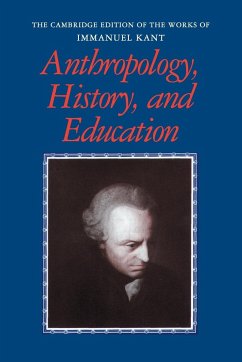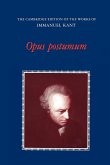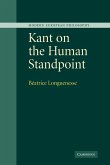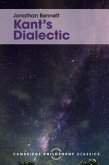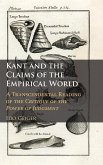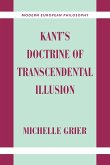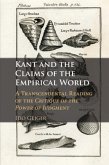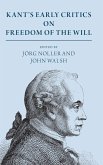- Broschiertes Buch
- Merkliste
- Auf die Merkliste
- Bewerten Bewerten
- Teilen
- Produkt teilen
- Produkterinnerung
- Produkterinnerung
Anthropology, History, and Education, first published in 2007, contains all of Kant's major writings on human nature. Some of these works, which were published over a thirty-nine year period between 1764 and 1803, had never before been translated into English.
Andere Kunden interessierten sich auch für
![Opus Postumum Opus Postumum]() Immanuel KantOpus Postumum49,99 €
Immanuel KantOpus Postumum49,99 €![Kant on the Human Standpoint Kant on the Human Standpoint]() Beatrice Longuenesse (New York University)Kant on the Human Standpoint52,99 €
Beatrice Longuenesse (New York University)Kant on the Human Standpoint52,99 €![Kant's Dialectic Kant's Dialectic]() Jonathan BennettKant's Dialectic21,99 €
Jonathan BennettKant's Dialectic21,99 €![Kant and the Claims of the Empirical World Kant and the Claims of the Empirical World]() Ido Geiger (Israel Ben-Gurion University of the Negev)Kant and the Claims of the Empirical World92,99 €
Ido Geiger (Israel Ben-Gurion University of the Negev)Kant and the Claims of the Empirical World92,99 €![Kant's Doctrine of Transcendental Illusion Kant's Doctrine of Transcendental Illusion]() Michelle Grier (University of San Diego)Kant's Doctrine of Transcendental Illusion52,99 €
Michelle Grier (University of San Diego)Kant's Doctrine of Transcendental Illusion52,99 €![Kant and the Claims of the Empirical World Kant and the Claims of the Empirical World]() Ido Geiger (Israel Ben-Gurion University of the Negev)Kant and the Claims of the Empirical World33,99 €
Ido Geiger (Israel Ben-Gurion University of the Negev)Kant and the Claims of the Empirical World33,99 €![Kant's Early Critics on Freedom of the Will Kant's Early Critics on Freedom of the Will]() Kant's Early Critics on Freedom of the Will92,99 €
Kant's Early Critics on Freedom of the Will92,99 €-
-
-
Anthropology, History, and Education, first published in 2007, contains all of Kant's major writings on human nature. Some of these works, which were published over a thirty-nine year period between 1764 and 1803, had never before been translated into English.
Hinweis: Dieser Artikel kann nur an eine deutsche Lieferadresse ausgeliefert werden.
Hinweis: Dieser Artikel kann nur an eine deutsche Lieferadresse ausgeliefert werden.
Produktdetails
- Produktdetails
- The Cambridge Edition of the Works of Immanuel Kant
- Verlag: Cambridge University Press
- Seitenzahl: 614
- Erscheinungstermin: 2. Oktober 2011
- Englisch
- Abmessung: 229mm x 152mm x 33mm
- Gewicht: 900g
- ISBN-13: 9780521181211
- ISBN-10: 0521181216
- Artikelnr.: 32465381
- Herstellerkennzeichnung
- Libri GmbH
- Europaallee 1
- 36244 Bad Hersfeld
- gpsr@libri.de
- The Cambridge Edition of the Works of Immanuel Kant
- Verlag: Cambridge University Press
- Seitenzahl: 614
- Erscheinungstermin: 2. Oktober 2011
- Englisch
- Abmessung: 229mm x 152mm x 33mm
- Gewicht: 900g
- ISBN-13: 9780521181211
- ISBN-10: 0521181216
- Artikelnr.: 32465381
- Herstellerkennzeichnung
- Libri GmbH
- Europaallee 1
- 36244 Bad Hersfeld
- gpsr@libri.de
Immanuel Kant ( 22 April 1724 - 12 February 1804) was an influential German philosopher[23] in the Age of Enlightenment. In his doctrine of transcendental idealism, he argued that space, time, and causation are mere sensibilities; "things-in-themselves" exist, but their nature is unknowable.[24][25] In his view, the mind shapes and structures experience, with all human experience sharing certain structural features. In one of his major works, the Critique of Pure Reason (1781; second edition 1787),[26] he drew a parallel to the Copernican revolution in his proposition that worldly objects can be intuited a priori ('beforehand'), and that intuition is therefore independent from objective reality.[b] Kant believed that reason is also the source of morality, and that aesthetics arise from a faculty of disinterested judgment. Kant's views continue to have a major influence on contemporary philosophy, especially the fields of epistemology, ethics, political theory, and post-modern aesthetics. He attempted to explain the relationship between reason and human experience and to move beyond the failures of traditional philosophy and metaphysics. He wanted to put an end to what he saw as an era of futile and speculative theories of human experience, while resisting the skepticism of thinkers such as David Hume. He regarded himself as showing the way past the impasse between rationalists and empiricists,[28] and is widely held to have synthesized both traditions in his thought.[29] Kant was an exponent of the idea that perpetual peace could be secured through universal democracy and international cooperation. He believed that this would be the eventual outcome of universal history, although it is not rationally planned.[30] The nature of Kant's religious ideas continues to be the subject of philosophical dispute, with viewpoints ranging from the impression that he was an initial advocate of atheism who at some point developed an ontological argument for God, to more critical treatments epitomized by Schopenhauer, who criticized the imperative form of Kantian ethics as "theological morals" and the "Mosaic Decalogue in disguise",[31] and Nietzsche, who claimed that Kant had "theologian blood"[32] and was merely a sophisticated apologist for traditional Christian faith
Introduction Robert B. Louden; Observations on the feeling of the beautiful
and sublime (1764) translated by Paul Guyer; Essay on the maladies of the
head (1764) translated by Holly Wilson; Review of Moscati's work of the
corporeal essential differences between the structure of animals and humans
(1771) translated by Günter Zöller; Of the different races of human beings
(1775) translated by Holly Wilson and Günter Zöller; Essays regarding the
philanthropinum (1776/1777) translated by Robert B. Louden; A note to
Physicians (1782) translated by Günter Zöller; Idea for a universal history
with a cosmopolitan aim (1784) translated by Allen W. Wood; Reviews of J.
G. Herder's Ideas for the Philosophy of the History of Humanity, Parts 1
and 2 (1785) translated by Allen W. Wood; Determination of the concept of a
human race (1785) translated by Holly Wilson and Günter Zöller; Conjectural
beginning of human history (1786) translated by Allen W. Wood; Some remarks
on Ludwig Heinrich Jakob's examination of Mendelssohn's Morning Hours
(1786) translated by Günter Zöller; On the Philosophers' medicine of the
body (1786) translated by Mary Gregor; On the use of teleological
principles in philosophy (1788) translated by Günter Zöller; From
Soemmerring's On the Organ of the Soul (1796) translated by Arnulf Zweig;
Anthropology from a pragmatic point of view (1798) translated by Robert B.
Louden; Postscript to Christian Gottlieb Mielcke's Lithuanian-German and
German-Lithuanian Dictionary (1800) translated by Günter Zöller; Lectures
on pedagogy (1803) translated by Robert B. Louden.
and sublime (1764) translated by Paul Guyer; Essay on the maladies of the
head (1764) translated by Holly Wilson; Review of Moscati's work of the
corporeal essential differences between the structure of animals and humans
(1771) translated by Günter Zöller; Of the different races of human beings
(1775) translated by Holly Wilson and Günter Zöller; Essays regarding the
philanthropinum (1776/1777) translated by Robert B. Louden; A note to
Physicians (1782) translated by Günter Zöller; Idea for a universal history
with a cosmopolitan aim (1784) translated by Allen W. Wood; Reviews of J.
G. Herder's Ideas for the Philosophy of the History of Humanity, Parts 1
and 2 (1785) translated by Allen W. Wood; Determination of the concept of a
human race (1785) translated by Holly Wilson and Günter Zöller; Conjectural
beginning of human history (1786) translated by Allen W. Wood; Some remarks
on Ludwig Heinrich Jakob's examination of Mendelssohn's Morning Hours
(1786) translated by Günter Zöller; On the Philosophers' medicine of the
body (1786) translated by Mary Gregor; On the use of teleological
principles in philosophy (1788) translated by Günter Zöller; From
Soemmerring's On the Organ of the Soul (1796) translated by Arnulf Zweig;
Anthropology from a pragmatic point of view (1798) translated by Robert B.
Louden; Postscript to Christian Gottlieb Mielcke's Lithuanian-German and
German-Lithuanian Dictionary (1800) translated by Günter Zöller; Lectures
on pedagogy (1803) translated by Robert B. Louden.
Introduction Robert B. Louden; Observations on the feeling of the beautiful
and sublime (1764) translated by Paul Guyer; Essay on the maladies of the
head (1764) translated by Holly Wilson; Review of Moscati's work of the
corporeal essential differences between the structure of animals and humans
(1771) translated by Günter Zöller; Of the different races of human beings
(1775) translated by Holly Wilson and Günter Zöller; Essays regarding the
philanthropinum (1776/1777) translated by Robert B. Louden; A note to
Physicians (1782) translated by Günter Zöller; Idea for a universal history
with a cosmopolitan aim (1784) translated by Allen W. Wood; Reviews of J.
G. Herder's Ideas for the Philosophy of the History of Humanity, Parts 1
and 2 (1785) translated by Allen W. Wood; Determination of the concept of a
human race (1785) translated by Holly Wilson and Günter Zöller; Conjectural
beginning of human history (1786) translated by Allen W. Wood; Some remarks
on Ludwig Heinrich Jakob's examination of Mendelssohn's Morning Hours
(1786) translated by Günter Zöller; On the Philosophers' medicine of the
body (1786) translated by Mary Gregor; On the use of teleological
principles in philosophy (1788) translated by Günter Zöller; From
Soemmerring's On the Organ of the Soul (1796) translated by Arnulf Zweig;
Anthropology from a pragmatic point of view (1798) translated by Robert B.
Louden; Postscript to Christian Gottlieb Mielcke's Lithuanian-German and
German-Lithuanian Dictionary (1800) translated by Günter Zöller; Lectures
on pedagogy (1803) translated by Robert B. Louden.
and sublime (1764) translated by Paul Guyer; Essay on the maladies of the
head (1764) translated by Holly Wilson; Review of Moscati's work of the
corporeal essential differences between the structure of animals and humans
(1771) translated by Günter Zöller; Of the different races of human beings
(1775) translated by Holly Wilson and Günter Zöller; Essays regarding the
philanthropinum (1776/1777) translated by Robert B. Louden; A note to
Physicians (1782) translated by Günter Zöller; Idea for a universal history
with a cosmopolitan aim (1784) translated by Allen W. Wood; Reviews of J.
G. Herder's Ideas for the Philosophy of the History of Humanity, Parts 1
and 2 (1785) translated by Allen W. Wood; Determination of the concept of a
human race (1785) translated by Holly Wilson and Günter Zöller; Conjectural
beginning of human history (1786) translated by Allen W. Wood; Some remarks
on Ludwig Heinrich Jakob's examination of Mendelssohn's Morning Hours
(1786) translated by Günter Zöller; On the Philosophers' medicine of the
body (1786) translated by Mary Gregor; On the use of teleological
principles in philosophy (1788) translated by Günter Zöller; From
Soemmerring's On the Organ of the Soul (1796) translated by Arnulf Zweig;
Anthropology from a pragmatic point of view (1798) translated by Robert B.
Louden; Postscript to Christian Gottlieb Mielcke's Lithuanian-German and
German-Lithuanian Dictionary (1800) translated by Günter Zöller; Lectures
on pedagogy (1803) translated by Robert B. Louden.

